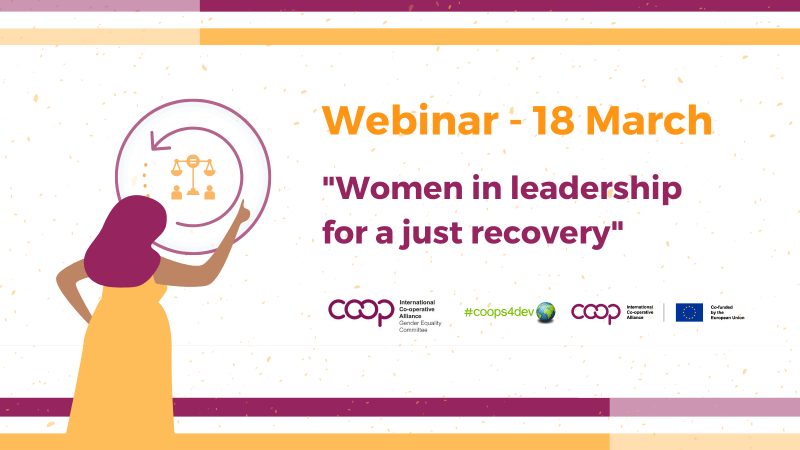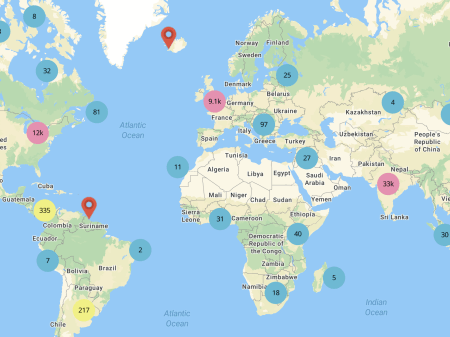
The International Cooperative Alliance’s Gender Equality Committee (GEC) with the support of the ICA-EU Partnership (#coops4dev) team, hosted a conversation on the role of cooperatives in helping women leaders to tackle gender inequalities.
The event was themed Women in leadership for a just recovery, in line with International Women’s Day, which was celebrated on 8 March.
Watch the recording here.
During the two sessions organised on 18 March, the panellists emphasised the need for urgent action as the Covid-19 crisis continues to exacerbate existing gender inequalities and illustrated how cooperatives that provide leadership opportunities for women could orchestrate a just recovery.
Cooperatives are already making a difference. The chair of the ICA’s Gender Equality Committee, Maria Eugenia Pérez Zea, talked about the work of the Colombian cooperative group, Coomeva, which has had a gender equality policy in place since 2013 and mentions gender equality in its cooperative statute. The cooperative has also obtained a gender equality seal certification named Equipares, which was developed by the Labour Ministry with the collaboration of the United Nations Development Programme (UNDP).
Prof Esther Gicheru from the Co-operative University of Kenya, who chairs ICA Africa’s Research and Gender Committees, looked at some of the initiatives undertaken by cooperatives in her region, from a Moroccan cooperative producing masks to the Mozambican Association for the Promotion of Modern Cooperativism (AMPCM) joining an awareness campaign on violence against women.
Xiomara Nunez de Cespedes, the chair of the Cooperatives of the Americas Gender Equality Committee and VicePresident of the GEC, talked about Cooproenf, a medical cooperative with 18,000 members. Throughout the pandemic, Cooproenf’s priority was to protect its members – it developed an economic contingency plan and decided to provide credit and advances to staff in need. It also used the crisis as an opportunity to digitise some of its services, developing a virtual educational programme to raise awareness about the pandemic.
Nandini Azad, the chair of the ICA’s Asia Pacific Women’s Committee, highlighted the need to challenge patriarchy and called on cooperatives to address gender-based violence. Women’s cooperatives in India suffered losses due to the pandemic but the majority did not shut down their businesses but instead adopted new strategies, particularly digital technologies, with some providing digital training to enable women members to access loans.
Stefania Marcone, a member of the GEC’s executive committee and Vice-President of Cooperatives Europe focused on the response of cooperatives in the region. Cooperatives Europe adopted a Gender Equality Charter in October 2020, in which it commits to strengthen its activities in closing the gender gap and calls on its members to implement the 10 commitments in their respective organisations. These include a work-life balance promotion, support for women in cooperative entrepreneurship and best practice sharing.
“COVID-19 is reversing the progress made on SDGs,” said Wenyan Yang, the chief of the Social Perspective on Development Branch of the United Nations Department of Economic and Social Affairs (UNDESA). She added that women were among the marginalised groups most likely to suffer as a result of the pandemic, along with older people, disabled people, indigenous populations, refugees and migrants.
Simel Esim, head of the ILO’s Cooperatives Unit, raised similar concerns about the impact of the pandemic on women healthcare and frontline workers, those in the service sector made redundant, or those working in the informal economy. Care responsibilities also fell heavily on women who have seen their hours for unpaid work extend, she added.
Cooperatives providing leadership opportunities for women could orchestrate a just recovery
Camila Lundberg from We Effect in Sweden, an NGO set up by cooperatives, explained how her organisation is driving gender equality by asking partner organisations to present projects with a gender element. We Effect has also pledged 50% of all official development funding for projects designed to benefit women and girls.
Judith Hermanson from the International Cooperative Research Group of the US Overseas Cooperative Development Council (OCDC) shared some of the findings of an OCDC comparative study on the difference co-ops make in Poland, Kenya, the Philippines and Peru. The research revealed that women’s income in cooperatives is higher than the average income in all four countries.
Simel Esim called on cooperatives to address the lack of female leaders in sectors such as agriculture or retail. She suggested additional measures, such as acknowledging care needs, ensuring work places are free from violence, recognising the needs of frontline workers, introducing flexible hours, offering paternity leave and tackling burnout.
Wenyan Yang argued that more women in leadership roles would accelerate progress and cooperatives that provide leadership opportunities for women could orchestrate a just recovery.
A celebration of the role of women in leadership in driving a just recovery
In March, the ICA highlighted the important role of cooperatives when addressing women in leadership for a just recovery through the campaign #coops4women.
Throughout the month, we shared a variety of projects, activities, and materials on this theme, including a Declaration for International Women’s Day 2021 on behalf of the ICA Gender Equality Committee (GEC) by its President Maria Eugenia Pérez Zea, and a publication compiling some cooperative best practices from around the world, titled "Women in leadership: achieving an equal future in a COVID-19 world".
On 18 March, the webinar took place as part of this campaign.




